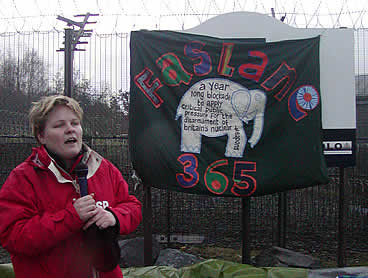Politicians in action at nuclear base in Scotland against mega-investment in nuclear submarines
Politicians in action at nuclear base in Scotland against mega-investment in nuclear submarines
SP Member of Parliament Krista van Velzen joined parliamentarians from a number of different European countries in a blockade action in front of the gates of the Royal Naval base at Scotland's Faslane. The action forms part of a continuous relay which has already gone on for three months and is aimed at protesting against plans by British premier Tony Blair £40bn (about €60bn/$75bn) on new nuclear submarines.

Krista van Velzen gives a speech to the participants in the blockade
“The same Tony Blair who is waging war in Iraq as part, or so it was claimed, of the struggle against weapons of mass destruction is himself buying an unimaginable sum of £40 billion's worth of just these weapons,” said Krista van Velzen, “And that in a country with so much unemployment and so many homeless people. Nuclear weapons are illegal, and have been declared such by the International Court. Yet the police don't arrest the weapons traders but those who, with justice, protest against them.”
The Royal Naval base at Faslane, Scotland, home port of the four British Trident nuclear submarines, is being blockaded today by a group of Members of the British, Scottish and European Parliaments. Krista Van Velzen was participating in the blockade at the invitation of a number of Scottish and other British colleagues from a range of parties including Labour, the Scottish Nationalist Party, Scottish Socialist Party and Plaid Cymru/the Party of Wales. “Within the Labour Party there is a sizable group of politicians who are not willing to sit by and see an investment of this nature in weapons of mass destruction, but who are instead arguing for this budget to be used in education, health care and good quality social housing,” Van Velzen explained. “Obviously Blair cannot even persuade his own people, let alone the people of Scotland, of the necessity of modernising nuclear weapons rather than dismatling them.”
The ‘Faslane 365’ action forms part of a relay in which, over 365 days, a number of different groups are passing the baton of the blockade Since 1st October 2006 students, church groups, environmental activists, development organisations, university lecturers and trade unions have taken their turn. The blockade is regularly broken up by the police, and to date 463 people have been arrested. Today it was the turn of the parliamentarians.
“The majority of Scots do not want nuclear-armed submarines in their waters,” said Van Velzen. “Despite this, Blair wants to modernise the whole nuclear fleet, without doing anything to scale down the arsenal of nuclear weapons in line with his country's commitments under the Non-Proliferation Treaty. The British are sailing twenty-four hours a day through Northern Hemisphere waters carrying weapons of mass destruction with an explosive capacity 400 times greater than the bomb which destroyed Hiroshima, while the Americans are doing the same in the Southern Hemisphere. How can the West speak with any moral authority to a country like Iran or North Korea?
"“In the UK there is a real debate going on about nuclear weapons. In the Netherlands the standard answer to every question about NATO's nuclear weapons on the air force base at Volkel is that their presence there can be neither confirmed nor denied. It's time we finally had a debate on weapons of mass destruction in the Netherlands. The opinion of the Dutch people should be properly taken into account.”
The politicians were carted away by the police in a special arrest bus, only minutes after they had begun their blockade action in front of the gates of the nuclear base. In the eveving they were released.
